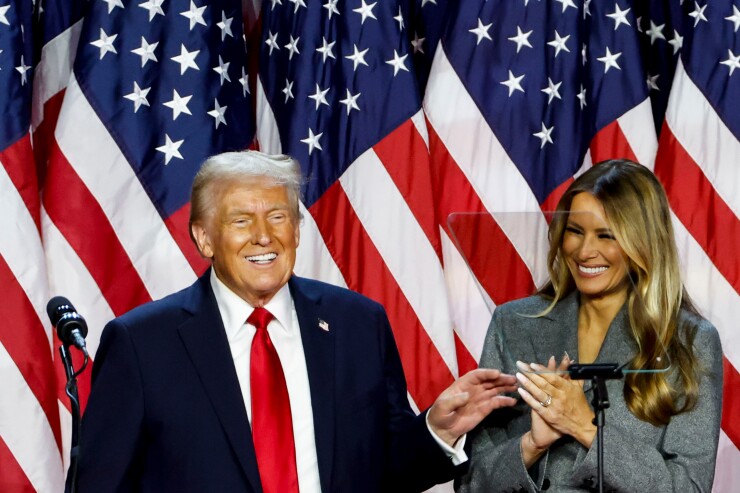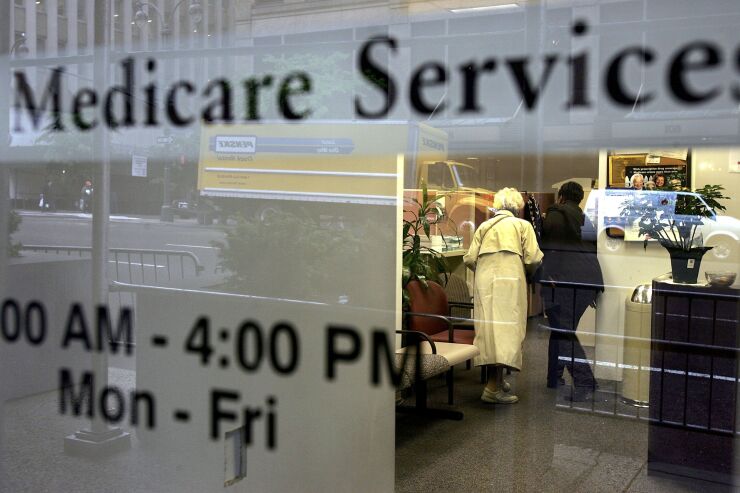The election has come and gone, with
One of the looming questions on the horizon is the future of the
RIAs not affiliated with broker-dealers and advisors with banks or wirehouses felt the same, with 44% and 39% respectively putting the standard deduction at the top of their list of concerns. Other noteworthy provisions that drew attention included a higher minimum floor of estate value subject to estate tax and limiting deductions for state and local tax payments.
Speaking at an event this month, Anna Taylor,
Read more:
Emotions have been running high in the investing space since Nov. 5, as election results compounded with the Federal Reserve's 25-basis-point cut to send many bank stocks soaring. But for others who were unsatisfied with the news of a second Trump term,
"I spent most of last week meeting with clients who were in tears, concerned about their safety and the safety of their friends," Jay Zigmont, CEO of
The common thread among the advice offered by Zigmont and other experts that weighed in on what consumers can do to bolster their portfolios and retirement plans could best be categorized as first consult your advisor, then keep calm and carry on.
Scott Clemons, partner and chief investment strategist for Brown Brothers Harriman in New York, said that "the biggest contribution that an advisor can make to clients in an environment like this is to just slow down their thinking" and "act as a sounding board."
"It is sort of an innate behavioral necessity to look at change and conclude from it that surely we should do something. … One [thing I've done] is talk people off the ledge they may be sitting on, whether the ledge is a ledge of despair or a ledge of euphoria, depending on where they fall along the political spectrum, and simply say the way you invest, your asset allocation, your risk tolerance, your need for liquidity and your need for growth, is not related to who sits in the Oval Office or what party controls Congress," Clemons said.
Read more:
Curious to learn more about how the markets reacted to the election, and what 2025 could look like? Read on for expert insights surrounding the future of Social Security, Medicare and more.
Small-cap stocks react to Trump reelection, Fed rate cut

The morning after Trump's victory, and weeks following the Federal Reserve's half-point interest rate cut, market indexes for small to mega-cap stocks recorded significant jumps.
The small-cap Russell 2000 Index rose 5.8%, while both the large-cap Russell 1000 and mega-cap Russell Top 50 indexes each ticked up by 2.7%. Francis Gannon, co-chief investment officer of Royce Investment Partners in New York City, found that the Russell 2000's returns were the
Read more:
Advisors weigh in on joint impact of Trump win, second Fed rate cut

Between the confirmation of a second Trump term, and a 25-basis-point rate cut from the Federal Reserve, advisors are left wondering what is the best path forward for their client portfolios and the industry at large.
Federal Reserve Chairman Jerome Powell
"Powell made it clear that he was not intimidated by the return of President Trump, and will not voluntarily leave his post," Timothy D. Calkins, co-chief investment officer at Nottingham Advisors Asset Management in Buffalo, New York, said in an interview with FP's
Read more:
Medicare's future under a second Trump administration

More out-of-pocket expenses, higher retirement age and more are on the horizon if Trump is
Under the
"We've been telling financial advisors they need to make sure that people understand what the potential impact will be, not only for the current retirees, but for future retirees," Ron Mastrogiovanni, president of the cost-projecting software company
Read more:
Stock gains following Trump victory fuel prospect of big bonuses for Wall Street CEOs

Top leaders at Goldman Sachs Group, Carlyle Group, JPMorgan and more are awash in the effect Trump's return is having on the stock market and in turn, their organizations' share prices.
Should the 10% jump in Carlyle's share prices on Nov. 6 hold for another month, CEO Harvey Schwartz will earn another $50 million from his signing bonus. Similar situations are in place for David Solomon, CEO of Goldman Sachs, and Jamie Dimon, chairman and CEO of JPMorgan Chase, who stand to earn similar sums should share performance stay the course.
Many of these incentive programs were put in place during 2021, when the market was witnessing record deal volumes. Now, the election news is helping executives hit key benchmarks.
Read more:
How secure is Social Security?

Trump has been vocal about his opposition to making direct changes or cuts to Social Security benefits, as his
Nikki Haley and Senator Rick Scott, R-Fla., two prominent Republican party members, have respectively supported raising the retirement age and allowing Social Security to expire without Congress' express renewal every five years. While there's no guarantee Trump is immune to these influences, experts are holding the president-elect to his promises."If I look at what he's been saying … he does not want a reduction in benefits, he does not want to delay the retirement age," Ron Mastrogiovanni, president of the cost-projecting software company
Read more:
The 9 areas of wealth management to change under Trump

Financial advisors have shifted focus from worrying about who would be in the White House next year, to guiding clients through a second Trump term and uncertain market conditions.
The top tips? Looking at past election cycles' impact on investments, hearing out clients' worries and working to assuage any doubts, according to statements by Hannah Moore of Richardson, Texas-based
"Between constant political ads, uncomfortable family discussions and a plethora of dire social media posts, election season can be stressful," Moore wrote. "Many people worry about how the results of an election (especially the presidential race) will impact their investments. This anxiety can be even higher for clients who disagree with the outcomes."
Among the nine key areas impacted by the election, artificial intelligence, the Securities and Exchange Commission, the Supreme Court and more areas were all swayed by Trump's victory.
Read more:





